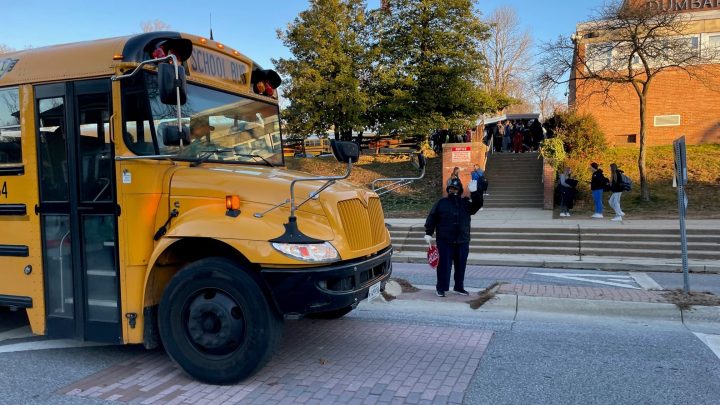
When school buses are delayed, the costs add up

Before he leaves for school around 7:15, it’s 12-year-old Aadarsha Neupane’s job to feed the family’s fish.
“There’s a goldfish, a big one, and a small goldfish and a catfish somewhere. I don’t know where he is. Or she,” Neupane said.
Neupane lives in suburban Baltimore, where his family moved from Nepal four years ago. This morning, it’s below freezing, but in true sixth-grader fashion, he turns down his dad’s offer of a knit hat. The walk to his middle school takes 35 minutes. There’s a school bus that would get him there in just seven, but it’s late so often that Neupane would rather go on foot.
“I don’t like not moving,” said Neupane.
There’s no federal data collected on school bus delays. But 8% of all transportation positions in public schools were vacant as of this October, according to the National Center for Education Statistics, a part of the Department of Education. The lack of staff means many of the drivers who are working have longer, less familiar routes with kids they don’t know. All that can lead to delays, which have costs — financial and otherwise.
For example, Neupane said that due to a late bus, he’s missed the beginning of his first period class multiple times, sometimes by up to 30 minutes. “It’s 46 minutes long, so I’d be missing more than half of the class.”
His dad, Deepak Neupane, grew up in a small village in Nepal, where he said he had to keep an eye out for leopards on his hourlong walk to school.
He drops Aadarsha off when he can, and when he has to be at work, he tracks his son’s location on a phone app. He would rather the bus come on time, but is proud of Aadarsha’s initiative.
“I agree with his determination,” said Neupane.

We asked Baltimore County school district about the delays, and it pointed to a statement from August saying it’s had trouble hiring enough drivers.
It’s a problem across the country. A lot of districts also have tiered busing systems, where the same bus will first pick up higher schoolers, then middle schoolers, then elementary students.
“Any little bit of trouble can kind of multiply, and suddenly you can have a whole lot of school buses that are showing up late to school,” said Jon Valant, who directs the Brown Center on Education Policy at the Brookings Institution.
It’s not just class time kids miss. Some also lose out on school breakfast.
“Showing up at school and not being able to eat is a bad start to the morning for a lot of kids,” Valant said.
A delayed school bus is also a bad start for parents who can’t begin their day until the kids are out the door.
“I can’t have a real job,” said Rima Izquierdo, who lives in the Bronx in New York City. She has a part time job and would like to work full time like her husband does. But in the morning, she’s responsible for three of her own kids and a friend’s child. Three of the kids have disabilities. They also have individualized education programs, as do close to half of the 150,000 students in the city who rely on school buses.
“All four kids get picked up and dropped off at my house on the bus. One of us can’t work, because there is always something wrong,” said Izquierdo.
The New York City Council analyzed school bus delays in the district (the country’s largest), and found they were at an all time high this October, averaging 41 minutes.
“When the bus is delayed, particularly for special education children, they miss their classes,” said New York City Council member Gale Brewer. “The fact that we had the pandemic for a couple of years, I can promise you a lot of these kids did not go to school.”
The New York City Department of Education said in a statement that it’s committed to improving every aspect of the transportation system. It also launched an app called Via to track where buses are in real time.
But everywhere in the country, late buses are a visible sign that things aren’t working as they should.
“The yellow school bus is the most iconic and loaded symbol that we have in education and education policies,” said Jon Valant with Brookings. “I do think they they play a real part in our understanding of schools.”
Which is why, when buses are late, what can also be lost is trust — between families and the education system as a whole.
There’s a lot happening in the world. Through it all, Marketplace is here for you.
You rely on Marketplace to break down the world’s events and tell you how it affects you in a fact-based, approachable way. We rely on your financial support to keep making that possible.
Your donation today powers the independent journalism that you rely on. For just $5/month, you can help sustain Marketplace so we can keep reporting on the things that matter to you.











